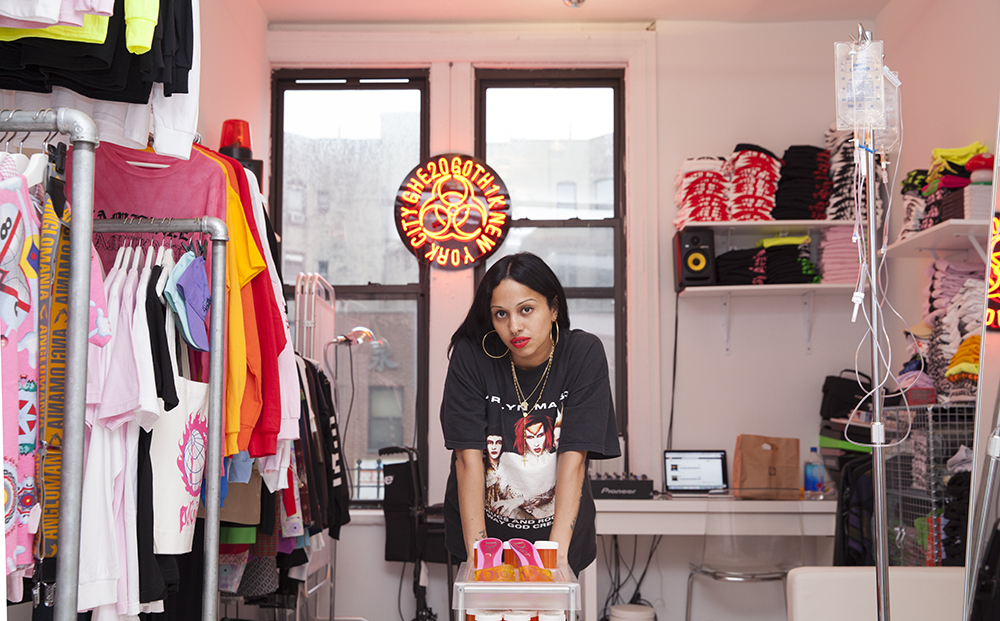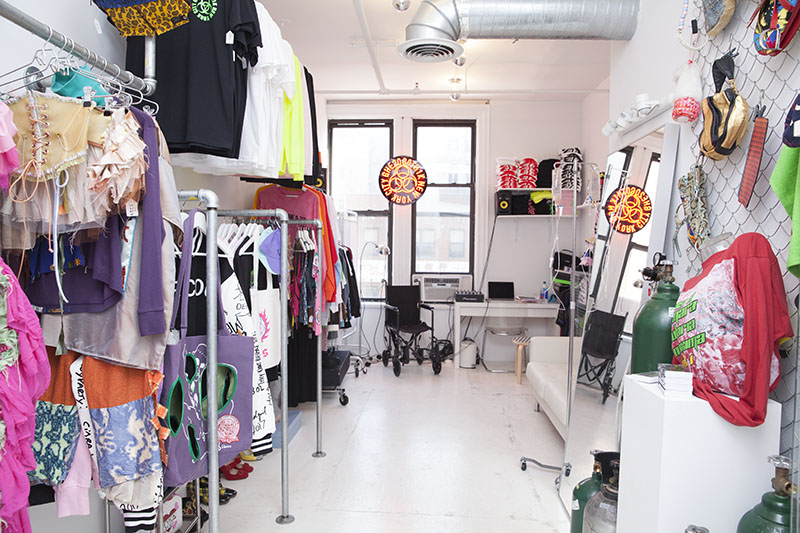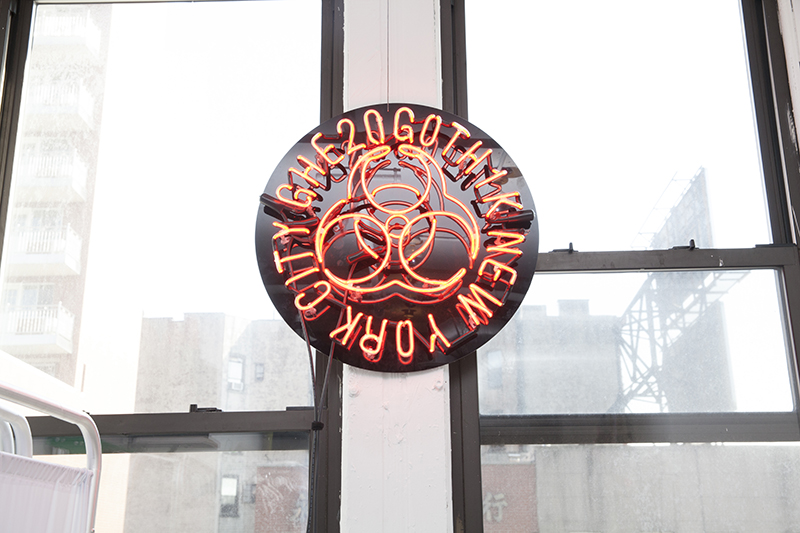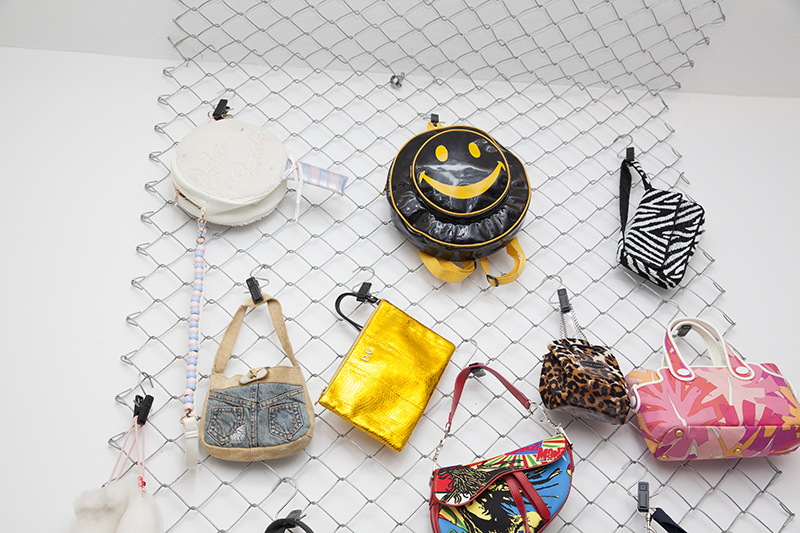Venus X on Planet X
It’s a windy afternoon in New York. Five floors up, tucked away from the harsh bite of the first days of winter is a blush pink oasis, packed with some of the most influential women in the city. Among them is Venus X. We’re at the Wing’s new SoHo location and Venus is nestled behind a marble table staring intently at her computer. She’s outfitted in a bright orange sweatsuit and her rhinestoned fingernails move diligently across her keyboard. She was out late the night before DJing the closing party of Performa, the performance art biennial, after moderating a talk about advocating for artists rights at a New Museum youth summit. It’s safe to say this is a rare moment of quiet for the powerhouse DJ and cultural entrepreneur.
Venus X is a New York native whose underground party GHE20G0TH1K has played an integral role in preserving a now globalized movement of the unrecognized, the underrepresented, the minority, the outsider, and everything in between. In crafting and exploring the GHE20G0TH1K ecosystem, which now includes the Planet X retail store, Venus has created a space for reinvention and diversity, fueled by endless possibilities for self-expression. She is the soft spoken, whip-smart, warm, and courageous force behind one of the city’s most critical and revitalizing communities.

Yelena Keller: You’re a native New Yorker, who’s played a vital role in the evolution of the city’s cultural landscape. Can you tell us about your upbringing and how you’ve seen New York change or evolve over the years?
Venus X: I grew up uptown in the ’90s when there was a lot of crime in New York. I remember not being allowed to do very much, but my mom used to take me downtown to Canal Street Jeans and St. Mark’s Place. She showed me what was left of the punk and street culture in New York. When I was a teenager I started to get into sneaker and streetwear culture because that was really accessible. Everybody could get sneakers so that became your ticket into a conversation or a friend group. The early 2000s definitely felt a little bit empty and commercial but then by the late 2000s a lot of my friends were in bands, they were DJing and designing clothes, and I watched the city change through that lens.
The fantasy of what New York was supposed to be is what influenced me the most. I watched movies about New York when I was a teenager and then as an adult I wondered, what happened to that place? I realized that that was only gone because people had grown out of it, passed away, or evolved, and so it was really important for my generation to bring something to that legacy. The downtown club culture, which was the cornerstone of why New York was always cool, incubating and producing new things, was especially important to us. We became this really diverse melting pot of all these different lifestyles.
What sort of challenges have you faced as a woman of color in the nightlife and DJ worlds?
There are not a lot of women that do what I do, so getting paid is hard. People like to undermine the work women do, or pay men more because their image is more cohesive. There’s not a lot of respect for women who have ideas and are pioneering techniques or who know how to use equipment and have real skill. Those are not things that people care about women contributing to the field. So, it’s been difficult to not be seen as just an entertainer all the time. To excel in this field as a person with a clear perspective and a mastery of a specific kind of DJing that is not computer-based is hard. It’s been a slower ascent. I use DJing as a medium to create spaces and bring people together and do exactly what I want. I think that there’s not very many women in this particular genre who are allowed to do that, especially in America. It’s different in other countries. It changes the entire context to be in a country where people have healthcare or maternity leave. Women are extremely oppressed in America and are still fighting for their basic humanity. Women in America don’t even have abortion rights. On any given day, we might not be able to take care of ourselves. It’s really hard to be a woman DJ and a woman artist who isn’t just considered an object in the room pretending to make noise.

Do you notice the difference when you travel and do shows outside of the country?
Absolutely. People are more open-minded to women providing a real contribution to the art form. People are ready to discuss and contextualize the way that I work as opposed to just the way that I look. People are not just paying me for my persona. It’s less important what I’m wearing, it’s less commercial outside of America. It goes in extremes here, it’s either really underground like where I started, or really commercial. There’s no middle ground. I’m either making a lot of money or I’m making no money, and when I’m making a lot of money, they don’t want to hear what I’m playing. In other places, there is more of a middle ground, and I think that has a lot to do with the fact that we’re exporting a certain sound and style. People take that for granted here. When you go somewhere else, they’re just happy to have you there, you’re bringing something new. This is something that’s very specific to my experience in my body and being constantly objectified. Everything I do is mediated by my sexuality.
It’s been a year since Donald Trump was elected to be the 45th President of the United States. The actions of the Trump administration over the past year have redefined perceptions of progress in the United States and have been the catalyst for the emergence of a greater consciousness. As someone who has spent the past eight years actively creating safe spaces for communities of color and LGBTQ folks around the world, how has this presidency changed the way in which you’ve approached the work that you do?
I think it’s great that people are realizing the importance of creating safe spaces and having a safe country where the political agenda takes everyone into account, but that realization is not good enough. I will continue to be a radical extremist and keep deliberately making spaces where everyone is allowed. People are like “oh this place is so queer” and I’m like, “no, this is actually normal. What’s queer is you guys trying to exclude everybody from the dialogue.” I hate the word queer. There’s nothing queer about being fair to everyone that’s living on earth, or giving everyone the space to be themselves, live, and make money. It’s not weird, it’s not marginal, it’s not a radical idea. I do think it’s kind of funny. People are fighting for things to be normal and calling it liberal, but that’s not liberal. Liberal is paying everybody to be here and making everyone go to alternative sex-ed class, take gender studies, and asking them to prove that they’re actually straight—that’s radical. It’s not radical to say if you want to be who you are, just go do it, and also here’s some healthcare, a job, and a place to live. But, the majority of us have real problems. Our problem is that we’ve created an infrastructure that prevents us from actually doing things the way that they should be done organically. We live on a planet and there are plenty of resources. At the very bare minimum, there should be enough resources to enable everyone to live comfortably, and that includes political resources.
Would you say that the regeneration and repopularization of these conversations has sparked commercial interest in marginalized communities and the issues that affect them?
Absolutely. Everyone is a feminist, everyone is like, “we have to help each other,” “we have to fight for our trans sisters.” But, we needed to be doing that twenty years ago, and we need to be doing it in fifteen years. We need to not be trying to make money off of it, how about that? It’s fucked up that people are using this energy to propel their careers and it’s not actually a part of the conversations that they have in their life. I feel comfortable when everyone feels comfortable. I feel safe when everyone feels safe.

You started GHE20G0TH1K in 2009. Can you tell me about those early days and how the community has grown since then?
GHE20G0TH1K was created in 2009 as a space for experimentation and as an incubator for friends. I was twenty-three and had just started DJing and I didn’t realty know how to use the equipment yet. I was using an iPod, computer, two channel, light mixing, but then every month would graduate to another level and or move on to better equipment. Eventually I was using CDJs and we were going weekly. Me, Shane, and a couple of other DJs Like Physical Therapy, Total Freedom, Kingdom. There was this new generation and this slightly more advanced generation of DJs and we were like having this dialogue that was both technique-based and genre-based but also a lot about ideas and emotions that we were going through. So there was really punk energy. That was the foundation of what became a very regular rave system, or house parties. There were a lot of all-ages nights. There were always really alternative lineups with DJs and performers and people who were not already being booked or headlining other shows. We were breaking a lot of new talent and bringing a lot of people to the forefront. We were always unintentionally trendsetting, either with the music we played in our earlier sets, or with who we booked later on. Of course we like what everyone likes. We like pop culture but we also want to deconstruct pop culture and to bring new things from our world the subculture—to the popular world. We knew that influencers, artists, designers, and people who were looking for inspiration and muses were coming to our space in order to dance and to make friends and to find something unique. We had to provide that or else we would just become another part of the circle jerk.
You recently opened the Chinatown location of your clothing store Planet X. What sort of things do you sell at the shop and what inspired you to open the space?
The store itself is just like the party—it is an incubator for new brands. The shop is for the community that we work with and anybody who we feel understands what we’re doing and wants to be a part of that. We can’t just push our own agendas, we have to push for the goals of our community and the general welfare of the art, city, and culture that we live in. You can see that in the store because we don’t just have brands that are going to sell out or will have a line around the block. Instead, we are about cultivating that consumer and being on the precipice of what will be the next big thing. The store plays an active role in building community and generating a conversation around new ideas. We sell our own stuff which is more music and merch and then there are staples that are parts of your uniform that you will need forever. A vinyl trench coat which is a staple of the GHE20G0TH1K look and the culture that we’ve created. There are certain designers like Hood By Air and Telfar and there are certain looks which are inspired by previous generations who combined ghetto and gothic aesthetics in music videos and on the runway, but that trended out. We’re trying to retain the things that make sense—not throw the baby out with the bathwater. I get that time evolves, but there are so many good ideas and items that we’ve perfected, and others that we are continuing to evolve.
Ultimately, Planet X is more than a store. We have created another space that is really just for the community, and I hope it keeps growing. Retail shouldn’t be just a commercial experience. We should have a concept and it should be part of the culture. And when it’s not, that’s when it’s pure capitalism.
It’s not bad to sell things, but it is bad to sell things without context or without any connection. I’m thinking about where these things come from, what are their materials, who made them, and who do they service. Does this economy sustain people or is this just for one person to get rich? So the store addresses all of the things that are important to us and gives us a daytime space to listen to the same music but also to open up new conversations.

Last year you launched the GHE20G0TH1K label with the Fuck Mary Kill mixtape by LSDXOXO. Why was it important to you to create this platform, and how has it been to be able to give other DJs and designers these opportunities?
We are developing the GHE20G0TH1K label slowly, mostly because of resources but also because of the artists themselves. We want to be able to provide a holistic support system. It’s not just about putting out their music for us. It’s about hiring them for shows and getting them jobs. LSDXOXO is a resident at all of our parties, we take him on tour with us, and he works at the store. We’re thinking about the artist’s entire world as opposed to just doing what benefits us or just having their masters.
Who have been some of your fashion inspirations over the years, and who do you look forward to watching in the future?
I’m really excited about some of the brands that we carry at Planet X, like Cometees, Lou Dallas, and NO SESSO. I’ve also been inspired by Walter van Beirendonck, Vivienne Westwood, Malcolm Mclaren, Rei Kawakubo, and Jean-Paul Gaultier. Gaultier would put out mixtapes with his collections. He’s a fucking genius. He proves that what we’re doing isn’t new. We’re not pioneering the development of multifaceted cultures, this shit has been going on forever. Great designers respect and understand the whole universe that they are part of and that they are inspired by. It’s an ecosystem, creative as well as financial.
Yelena Keller is a New York-based writer from Oakland, California. She is an editorial consultant at Artsy.